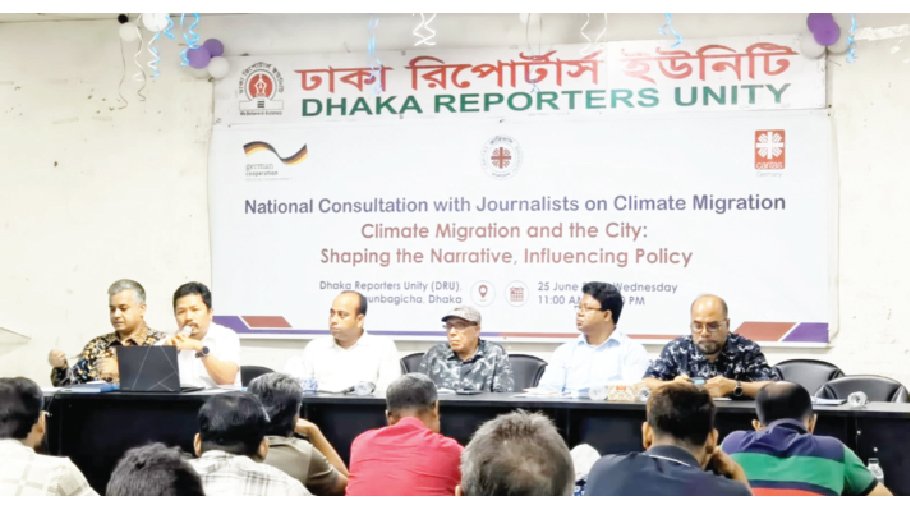Better livelihoods, living conditions can cut high migration to cities

Speakers at a national dialogue on Wednesday said that creating proper livelihoods and improving livable conditions for displaced and disaster-affected people can reduce excessive migration to cities.
They pointed out that migrants often end up in inhumane conditions, lacking access to basic services and security and the inadequacy of existing government policies to address this crisis was also underscored.
Head of Disaster Management at Caritas Bangladesh Alexander Tripura said that providing proper housing and livelihoods for the increasing number of displaced people has become a major challenge due to the lack of proper urban planning in the capital and other cities.
He came up with these remarks at the dialogue titled “National Consultation with Journalists on Climate Migration" organized by Caritas Bangladesh at the Dhaka Reporters Unity (DRU) in the capital on Wednesday.
At that time, he highlighted detailed information and data to media on the migration crisis caused by climate change.
The theme of the consultation event was 'Climate Migration and the City: Shaping the Narrative, Influencing Policy'.
Daily Prothom Alo Joint Editor Sohrab Hasan suggested to forming a working journalists group on climate change. As a result, media workers who work on climate change issues will be able to play a more effective role.
He also said that the issue is now a major crisis for the country. Every year, 20-25 lakh people are internally displaced in the country. These people are being forced to settle
in cities.
“Disasters occur every year in the coastal areas. As a result, people become refugees every year. But, they are not able to return to their home. They are moving to the cities. This did not happen overnight, it is happening continuously. As a result, the cities have become uninhabitable due to excessive pressure’’ he added.
He emphasised on the importance of ensuring proper allocation and quality implementation of government investments to create a disaster-resilient environment in disaster-affected areas.
General Secretary of Dhaka Reporters Unity (DRU) Mynul Hasan Sohel and Chief Reporter of The New Nation Rafiqul Islam Azad also delivered their speeches as special guests.
Caritas Bangladesh Director (Programs) Daud Jibon Dash highlighted the organisation’s initiatives to reduce risks and improve living conditions for climate-displaced, disaster-affected, vulnerable, and marginalized communities.
The keynote paper, authored by renowned environmental expert and former BRAC University Vice Chancellor Professor Dr Ainun Nishat, was presented by Alexander Tripura.
The dialogue was moderated by prominent development and media professional Dr Jamil Ahmed, Technical Adviser (Advocacy) at Caritas Bangladesh.
Journalists shared their experiences and perspectives related to the issues, and they were urged to produce more investigative reports on these gaps to influence both national and international policy responses.
Participants noted that due to cyclones, tidal floods, salinity intrusion, and river erosion, the rate of climate-induced internal migration is rising in Bangladesh.



